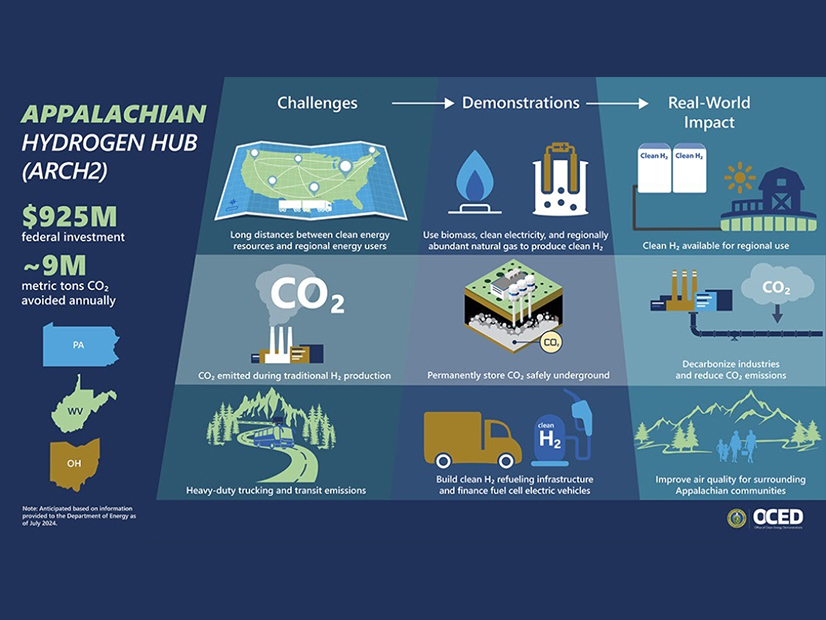
The Appalachian Regional Clean Hydrogen Hub is the third of seven regional hydrogen hubs to reach agreement with the U.S. Department of Energy.
The DOE Office of Clean Energy Demonstrations announced July 31 that the agreement was accompanied by $30 million in funding, the first tranche in what eventually could total as much as $925 million for the Appalachian hub, which is known as ARCH2.
ARCH2 projects so far are expected to span eastern and central Ohio, southwestern and northern Pennsylvania and almost all of West Virginia, home to Sen. Joe Manchin (I), chair of the Senate Committee on Energy and Natural Resources.
It is one of the seven regional hydrogen hubs DOE designated in October 2023, with a promise of up to $7 billion in federal funding and an expectation of more than $40 billion in funding from other sources.
Those designations have begun to be finalized. Earlier in July, DOE announced agreements with the California hub (ARCHES) and Pacific Northwest hub (PNWH2) to begin their Phase 1 work. (See California Reaches Funding Agreement to Launch Hydrogen Hub and Pacific NW Hydrogen Hub Launched with 1st Round of Federal Funds.)
Phase 1 for ARCH2 will last up to 36 months and entail solidifying planning, development and design activities surrounding site selection, technology deployment, community benefits, labor partnerships and workforce training.
The hubs are central to the Biden administration’s drive to develop hydrogen as an affordable and effective means of decarbonizing the economy.
Collectively, the hubs are intended to help form the foundation of a national clean hydrogen network; individually, each will have its own concentration.
ARCH2, headquartered in Morgantown, W.Va., is intended to develop means of producing, storing, delivering and using clean hydrogen. Many of the projects will involve generating hydrogen from natural gas and developing permanent storage of carbon dioxide, the greenhouse gas that is a by-product of this process. The diversity of projects is one of ARCH2’s differentiating factors.
The goal is production of more than 1,500 metric tons of hydrogen per day and reduction of 9 million metric tons of carbon dioxide emissions per year.
This hydrogen is intended to help decarbonize hard-to-abate sectors such as manufacturing and transportation, create thousands of jobs in communities impacted by the clean energy transition and benefit communities overburdened by pollution.
The net impact of generating hydrogen from natural gas leads some environmental advocates to scoff that it is not “clean hydrogen.”
In West Virginia, the Charleston Gazette-Mail reported in May on a DOE listening session at which ARCH2 was roundly criticized as a major environmental and economic liability that would risk locking the region into fossil fuel infrastructure while relying on a technology unproven at commercial scale.
The Ohio River Valley Institute and 54 other organizations petitioned DOE in May to suspend negotiations with ARCH2 until the process became more transparent.
Spotlight PA reported on fears held by some Pennsylvania residents about the harms ARCH2 might inflict upon public health and the environment.
But ARCH2 also has many supporters.
Manchin said in a news release July 31:
“I was proud to help bring ARCH2 to the Mountain State, which will strengthen America’s energy independence, adding to our all-of-the above approach to energy production through the expansion of hydrogen energy while lowering emissions and bringing good-paying jobs to our state.”
ARCH2 is led by Batelle and supported by a program management office consisting of Allegheny Science & Technology, GTI Energy and TRC. The National Energy Technology Laboratory also will provide support.
Development partners include Air Liquids, The Chemours Co., CNX Resources Corp., Enbridge Gas Ohio, Empire Diversified Energy, EQT Corp., Fidelis New Energy, Hog Lick Aggregates, Hope Gas, Independence Hydrogen, KeyState, Plug Power and TC Energy.



